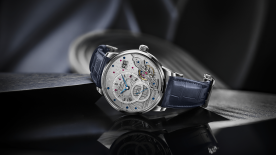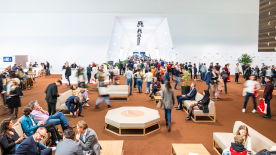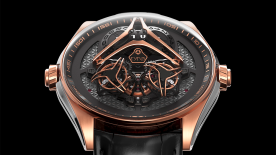It has always surprised me how rare it is in the watch industry for CEOs to come from other industries, but those who have come from the outside have been extremely successful. What would you say is the unique insight you are bringing from Firmenich?
I was also surprised, like you. If you look at all the other industries, they flourish because they nourish themselves with external points of view. And this is important – especially in an innovative industry – to be able to connect the dots and think differently to drive innovation.
So, I will leverage my 27 years of experience, three in Firmenich, and 24 more in Procter & Gamble, which was the best management school, allowing me to oversee different businesses in different countries and regions. The more you are exposed to the diversity of challenges and categories, the more you form a business brain that allows you to adjust to the external reality. Because the disease of insulated categories and careers is that you become blind to the outside.
When taking on a new role like this, where do you start?
You start by observing, not talking. That is why the onboarding I have done was a lengthy process because it was not sitting in a room, going through PowerPoint presentations and explanations. I realized that the best way is just to see how people behave in the organization, what they do and where they struggle. And observation is the best way to predict the priorities and define the struggles of the people. It has been a gift to do this and understand the roots of the company because where we are defines what we do and why we do things in a particular way.

What surprised you the most?
I was surprised by the level of savoir-faire, even with so much innovation, there is a real necessity to do things in a manual way to obtain the quality, precision and beauty of what we do. I thought it was a choice to do things by hand, but in reality, it is a necessity for both quality and for certain aesthetics. We have made certain design choices that could never be automatized.
This constant, healthy dissatisfaction with excellence is something that you always hear about, and it belongs a bit to Switzerland, to the Calvinists. When talking to the artisans and the experts, you see this devotion to the product and feel this transmission of love, which might sound very oneiric and poetic, but it is very present.
What initial goals have you set?
I have two lenses, the telescope and the microscope. The telescope is on the perennity and the independence of the company, which is a mission, a lighthouse, that I am very clear about. It is the most important mandate. And this will overrule any obstacle, any short-term decision I will make. In the microscope, I am really focused on watchmaking innovation, to continue pushing the boundaries and never stand still.
There is a second point for me that is also important and that is the relevance to different audiences, including women and the younger generations. In 10-15 years, 50% of our clients will be from Gen Z, and they are already vocal. They might not be clients now, but they are talking about watchmaking more and more, so it is important that we listen to them and stay relevant for them. This client-centricity is critical for me.

As a new CEO, how do you connect to the 2700+ Audemars Piguet employees worldwide?
I have learned that as you grow, you become alone. Especially in a new industry where you are starting out and don't know many people, it can be very dangerous because you are alone with your own ideas and you think these are the right ones. My way of staying connected is to position myself at the center of an organization by always talking to the people who do the work. For example, talking to a boutique manager who is the closest to the client, or the watchmaker who is closest to the product.
Obviously, I cannot talk with everybody, but it is very important to communicate as a leader, and to share what I am doing with my people. By doing so, they will understand me better and I will get closer to them. I started doing rounds of informal coffees with all the departments, where the idea is really to share where I am at and start a dialogue with them. You need to create a safe environment for people to come to you and talk, so my door is always open and I am going to try to get as close to everyone as I can.







